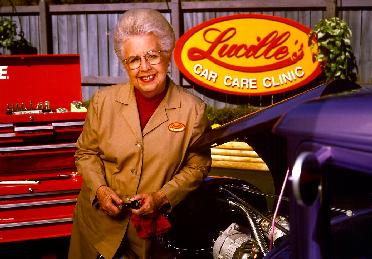Lucille Treganowan's Tips to Keep Cars and Drivers From Boiling Over
17 August 1998
The Heat is On -- Tips to Keep Cars and Drivers From Boiling Over
 HOUSTON--(BUSINESS WIRE FEATURES)--Aug. 17, 1998--Every month of
the year thousands of cars have to pull over to the side of the road
because of overheating. Here's a checklist and some tips from trusted
care car authority, Lucille Treganowan, a no-nonsense grandmother who
hosts a national television show, oversees two auto mechanic shops
and is the author of a popular book on car repair.
HOUSTON--(BUSINESS WIRE FEATURES)--Aug. 17, 1998--Every month of
the year thousands of cars have to pull over to the side of the road
because of overheating. Here's a checklist and some tips from trusted
care car authority, Lucille Treganowan, a no-nonsense grandmother who
hosts a national television show, oversees two auto mechanic shops
and is the author of a popular book on car repair.Prepare Your Vehicle
-- Examine radiator and heater hoses for signs of deterioration. This
could be hardness with small cracks and formation of a whitish
powder near the hose clamps, or a soft, squishy feel to the hose.
Replace all hoses if you find a bad one.
-- Check condition and adjustment of belts. A loose belt can affect
the efficiency of the water pump.
-- Check coolant level and add if necessary. If coolant is rusty or
murky, have a cooling system flush at Jiffy Lube.
-- Have the radiator pressure cap tested. For every pound of pressure
held by the cap, the boiling point of the coolant is raised two
degrees. A bad cap can result in overheating.
-- With a soft brush and a garden hose, clean all the bugs and debris
from the honeycomb part of the radiator.
-- Check the thermostat. Run the engine for ten to fifteen minutes,
then feel the upper hose. You should be able to feel the warm
coolant rushing through.
-- Clean the exterior of the engine. Accumulated oil and dirt will
cause heat retention.
If You Overheat On the Road
-- Turn off the air conditioner and open the windows. Without AC the
engine won't work quite so hard.
-- When you come to a stop, give the engine a little acceleration --
don't race it, just get it off idle. This will allow the water
pump and fan to operate more effectively.
-- If the car is still running hot, turn on the heater. This allows
the coolant to circulate in a larger area and will help lower the
temperature.
-- If the gauge still shows too high a temperature or the red light is
still on, pull off onto the side of the road and turn off the
engine. Raise the hood so air can circulate.
Because overheating can cause hoses to split and result in costly
engine damage if you continue to drive, here are some tips to
remember:
-- Don't take the radiator cap off an overheated car. Cool it down
first.
-- Carry a jug of water in your emergency kit in the trunk.
-- Antifreeze should be used in the cooling system all year round. In
the winter it prevents freezing of the coolant and in the summer
helps prevent boiling over.
-- Always check tire pressure when tire is cool.
Treganowan is the spokesperson for Jiffy Lube International, which has sent her all over America to deliver car care advice.
Jiffy Lube, which began in 1979, now has 1,560 centers in 48 states. For other helpful information about car care, you can visit the Web site at www.jiffylube.com.


